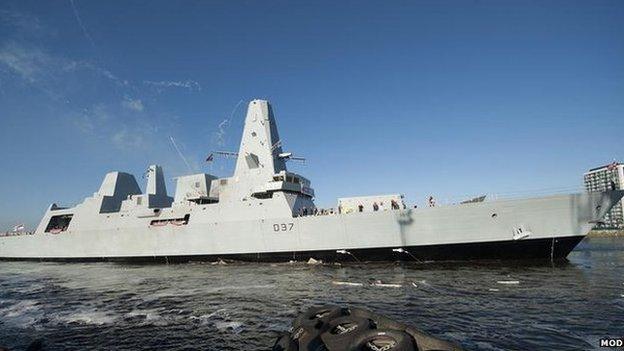Type 45 Destroyer 'Duncan' departure delayed by hitch
- Published

HMS Duncan was launched in 2010 and was due to leave the Clyde on Friday
The planned departure of a newly-built warship from its yard on the River Clyde in Glasgow has been delayed by "a technical issue".
The Type 45 Destroyer Duncan was due to leave BAE System's Scotstoun yard on Friday for Portsmouth Naval Base.
BAE said it was working with the Ministry of Defence (MoD) to resolve the hitch and the ship should leave in the coming days.
Duncan is the last of six destroyers to be built at the Clyde yard.
'No significant impact'
In a short statement, BAE Systems said: "The departure of Duncan from the Clyde has been delayed due to a potential technical issue.
"We are working with the Ministry of Defence to resolve the issue at the earliest opportunity and anticipate the ship will leave the Clyde in the coming days with no significant impact to the programme."
Duncan was due to leave on Friday morning for its journey to Portsmouth Naval Base, where it will be officially commissioned.
A media event to mark the departure, attended by BAE staff, was cancelled at short notice.
The Scotstoun yard has now completed a decade of work on the UK's new generation of six destroyers.
The first ship in the new Daring class, HMS Daring, was launched in February 2006.
Viper missiles
HMS Dauntless and HMS Diamond followed in 2007, with HMS Dragon in 2008, HMS Defender in 2009 and HMS Duncan in 2010.
All of the ships, with the exception of Duncan, have been handed over to the Royal Navy.
The vessels will be equipped with Sea Viper anti-air missiles.
Each will be able to carry 60 troops and has a large flight deck, able to accommodate a helicopter the size of a Chinook.
In emergency evacuation situations, each ship will be able to take up to 700 people on board.
- Published27 August 2011
- Published11 October 2010